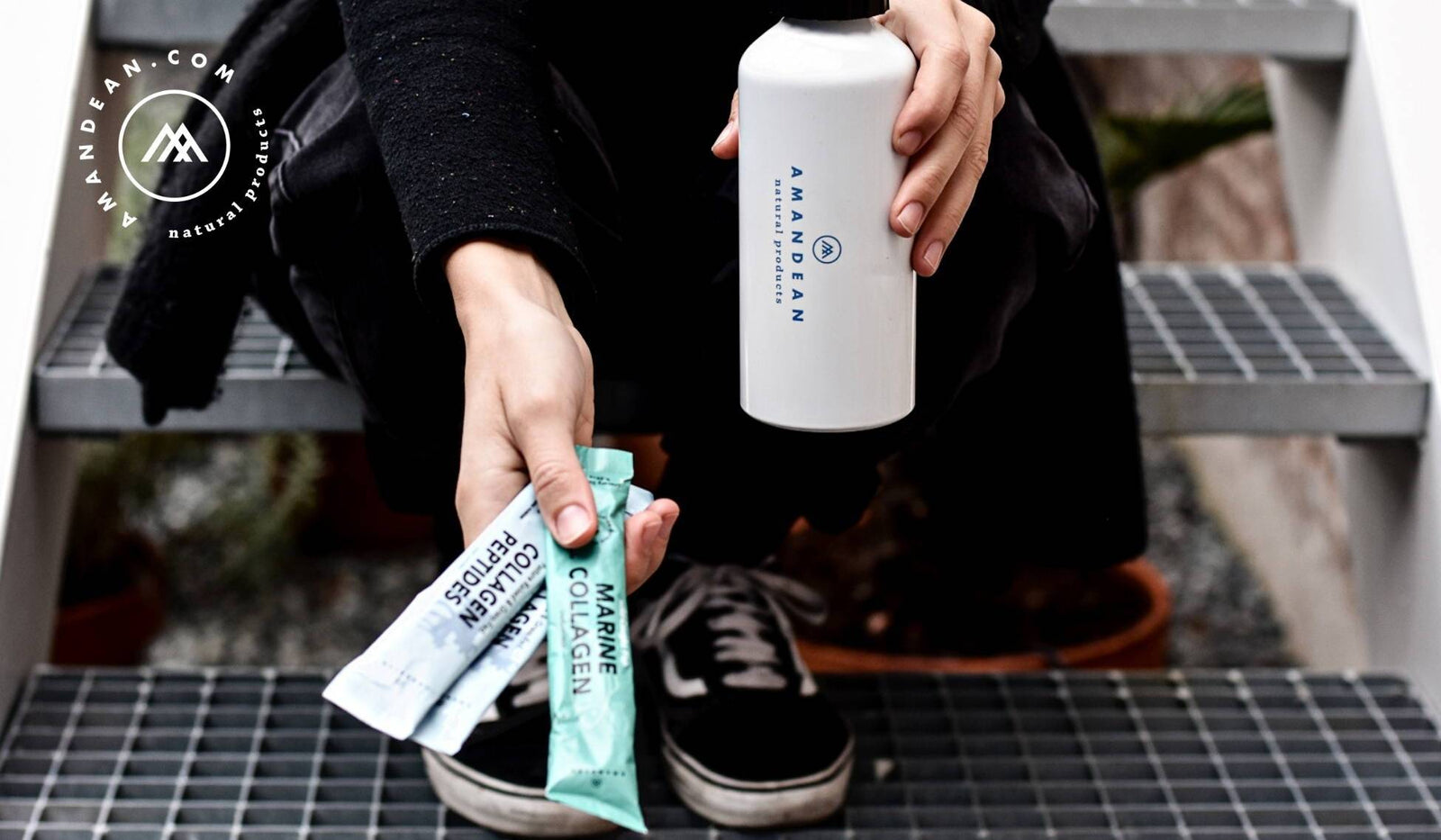Your Cart is Empty

February 03, 2023 6 min read
There's a reason why collagen has exploded in popularity in the last 5 or 6 years. Collagen is not just a man-made health supplement. At its most basic level, collagen is a structural protein that can be found in the connective tissues of all mammals, including humans. In fact, it is the most abundant protein in the human body. Have you ever wondered why kids can jump off the jungle gym and land on their feet without even the tiniest wince of pain, while after age 30 the stairs make our joints throb? That's a lack of collagen! Collagen production increases until our mid-twenties to add cushion to the joints, support muscle growth, and boost skin elasticity. Then, after about age 25, our collagen levels drop and open the door to joint pain and wrinkles.
Collagen supplements come in many forms. Collagen sourced from cows, chicken, and fish breaks down into the amino acids glycine, proline, and hydroxyproline. These amino acids then stimulate the body to produce new collagen and to support joint health, skin health, and more. Just as there are many different sources and forms of collagen, there are also different types of collagen. Types I, II, and III are the most abundant and the most influential. Type I is found all throughout the body. Type II is primarily in the ligaments and cartilage. Type III can be found in the same places as type I, but in lesser quantities and is primarily concentrated in the gut.
Oral supplementation of collagen has been linked to numerous benefits including:

There are collagen powders, capsules, pre-bottled drinks, liquids, creams, gummies, jellies.... the list continues to grow! In addition to reading through confusing ingredient lists, finding the right form of collagen for your goals can be tricky. But, we've got you covered! Below, we've compiled a list of more types of collagen supplements than you can imagine and evaluated them based on bioavailability or absorption rate, dosage, versatility, purity, efficacy, and more.
Let's kick off with the most popular form of collagen. Collagen protein powder is the "standard" form of collagen. Multi-collagen formulas contain collagen from multiple sources. Collagen peptides are often from cows, called bovine collagen. Marine collagen also comes in powder form. Of the three, bovine collagen from grass-fed cows and marine collagen from wild-caught fish are the most bioavailable, sustainable, and pure. Marine collagen powder, in particular, has the lowest molecular weight and up to 1.5x more bioavailability than bovine collagen.

In terms of versatility and ease of use, collagen powder is king. Think of it as a basic ingredient, almost like sugar or flour, that you can add to whatever recipe you want. You don't need to whip up a fancy superfood smoothie or bake a special sugary dessert to mask the taste. When you have a high-quality collagen powder, it shouldn't have any funny aftertaste or sweetener. Both bovine and marine collagen are hot soluble, meaning they can seamlessly blend into your morning coffee, pancakes, or bone broth. Marine collagen is even cold-soluble, so you can add it to your favorite iced latte or even bottle of water. Gelatin, a partially-cooked form of collagen, adds a natural gelling property to whatever warm ingredient it is added to. This means you can use it to thicken soups and lattes, or even make your own gummies.
In terms of portability, the large tubs aren’t ideal for lugging around. However, the powder can easily be pre-added to blender bottles and to-go containers. Just one scoop contains the daily recommended intake, but you can easily add an extra scoop before or after a workout to scale up your nutrition. Single-use collagen "sticks" can be purchased for collagen nutrition on-the-go.
Pros: Easy to combine in your favorite recipes and drinks, soluble in liquid, comes with a scoop to measure your intake, and easy to use on-the-go when you opt for individual stick packets.
Cons: You have to scoop, stir, or blend into drinks and recipes, and not all collagen powders have good solubility.
Take our quiz and find which supplements your body is craving.

The liquid form is a newcomer to the collagen "industry". Similar to MCT oil, liquid collagen formulations are sold in "dropper bottles", so you can add them to your favorite drink and go. There are many brands claiming that liquid supplements are more bioavailable than powders, so we checked it out. Here's what we learned.
Just like powdered collagen, liquid collagen is sourced from the skin, hides, and cartilage of animals. So what makes this liquid collagen formula unique? Honestly, not a lot. Liquid collagen is simply collagen powder mixed in some kind of liquid. It is literally diluted or pre-absorbed collagen powder. Essentially the only convenience or benefit it adds is not having to stir it into your drink. It is only as bioavailable as the collagen powder from which it is made. No claims of greater bioavailability have been scientifically proven.

Liquid collagen is just about as versatile as powdered collagen in that you can add it to many different dishes without a noticeable taste. If you don't feel like scooping it out, then perhaps liquid collagen is a great choice for you!
Studies on the bioavailability of liquid collagen don’t offer benefits over hydrolyzed collagen powder or capsules. With expensive liquid formulas, it's even harder to tell how much collagen you're getting with each serving and how much is "filler". They provide great ease of use, but it can be expensive and difficult to measure their efficacy.
Pros: Very versatile, quick and easy to add to drinks recipes, and easy to use on the go.
Cons: Difficult to measure and regulate intake, can be expensive, and does not deliver any additional bioavailability.
Pre-made collagen drinks, such as collagen water and collagen coffees, are also expanding, particularly into the drink coolers.
These pre-made drinks are a great grab-and-go option when you are out and about and want a healthy drink. However, there are some downsides. Of course, when you buy pre-made collagen water, it is a limiting source of collagen; it does not provide the same flexibility or versatility as a plain collagen powder or liquid. Many pre-made drinks also contain sweeteners and artificial flavors that can compromise the health benefits of a pure collagen formula. With powdered collagen supplement, you can easily pre-make your own collagen water and add whatever tasty and natural ingredients you desire. This also helps to cut down on single-use plastic waste.

All in all, pre-made collagen drinks are a great on-the-go option, but if you want to invest in collagen nutrition, you may want to invest in a powder or liquid, so you can make your own collagen recipes from home.
Pros: Great for on-the-go consumption.
Cons: Does not offer the same versatility as other forms of collagen, contains artificial sweeteners and ingredients, and contributes to plastic waste.
Collagen pills and capsules are also very convenient. In this case, you don't have to worry about making a new drink in order to get your daily collagen. However, the supplement-friendly user might be burned out on adding yet another pill to their "breakfast".
Additionally, collagen pills are not the most bioavailable source. Capsules, pills, and tablets need to be broken further before they can be used by the body. Compare this to powder or liquid that is easily and quickly absorbed, and pills really can't cast a shadow.
However, if you enjoy "getting it over with" and prefer to have a one-and-done pill, then collagen capsules are a great choice for you.
Pros: Convenient and effortless to incorporate into your diet.
Cons: Encapsulation makes this form of collagen less bioavailable, takes longer to absorb, and may be difficult for some people to swallow.
Collagen serums and creams are popular for those who want to take advantage of collagen's anti-aging benefits, but be advised: collagen molecules are too big to penetrate the skin barrier. That means the collagen in expensive skin creams really isn't making it into the skin. Any benefits you notice are due to the other active ingredients. For collagen skincare, the best route is from the inside out.

Pros: Topical collagen skincare products may contain other helpful skincare ingredients.
Cons: Topical collagen products do not deposit collagen into the skin or stimulate collagen production.
So what's the best collagen supplement? It depends on your lifestyle! Ultimately, collagen powder is a safe bet and can easily adapt to your nutrition and lifestyle needs. For more deep dives into the benefits of collagen, workouts, recipe ideas, and more, check out the Amandean blog!
Marine collagen powder, in particular, has the lowest molecular weight and up to 1.5x more bioavailability than bovine collagen.
Both bovine and marine collagen are hot soluble, meaning they can seamlessly blend into your morning coffee, pancakes, or bone broth.
Liquid collagen is simply collagen powder mixed in some kind of liquid.
Many pre-made drinks also contain sweeteners and artificial flavors that can compromise the health benefits of a pure collagen formula.
Collagen molecules are too big to penetrate the skin barrier - that means the collagen in expensive skin creams really isn't making it into the skin.

October 31, 2024 7 min read

October 31, 2024 16 min read

October 23, 2024 14 min read